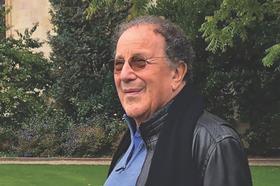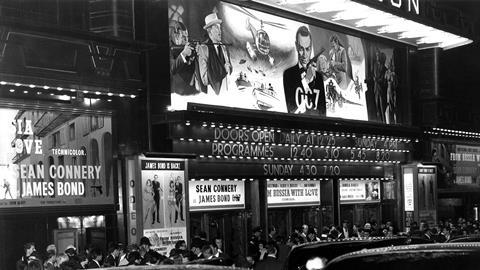It’s the dawn of the Swinging Sixties and newly demobbed Michael Simmons has landed a plum City job – with Jonathan Sumption’s father. Read on...
I was feeling very nervous on my first day at Malkin Cullis & Sumption. Had I talked myself into a job beyond my capabilities? David B, son of the senior partner of the firm with which we were demerging (and whom I was replacing), had kindly agreed to stay on for a couple of weeks to show me the ropes.

Fortunately, the work seemed to be within my range. The clients were an interesting mix. The old Malkin Cullis practice in the Temple had the type of client for whom I was accustomed to act. (Charles Cullis, the former principal, was now Master Cullis in the taxing department of the High Court.)
Anthony Sumption had added a stratum of City and more sophisticated clients. At first, I found these rather daunting but my fears soon evaporated. They could not have been more welcoming. I was soon in my element.
Initially, the litigation files were retained by the other firm but eventually I felt sufficiently confident to take them on. But my heart sank when an overloaded tea trolley was wheeled into my office. I soon realised that I was faced with years of what I call ‘mindless litigation’.
The managing clerks handling the work had been obsessed with procedure and had given no thought to the substance of the matters. No ‘without prejudice’ approaches to settle had ever been made. I changed all that and 90% of the files were closed within three months.
This fresh approach was welcomed by the lawyers on the other side. They were as glad to be rid of these long-drawn-out cases as I was. The clients were also happy.
The firm worked much more efficiently as the secretaries’ time was not wasted taking dictation. I had to learn to use my first dictating machine, the Rex Recorder, which employed disks. We had to wipe these clean with a magnet after every use.
I was able to work all hours and deposit the disks with the relevant files on the secretaries’ desks so that they could type what I had dictated. Files were kept neatly and alphabetically in their cabinets.
It quickly became clear, though, that I needed my own dedicated secretary. I had kept in touch with Joyce at the Major’s firm. She told me that she was bored as she did not have enough to do after I left. So she handed in her notice and came over to us.
All hell broke loose! The Major had no objection to my leaving, but was outraged that I had ‘stolen’ a secretary. By chance, Anthony Sumption was up for election to the City Club. He was blackballed by the Major as the partner of a secretary ‘thief’: guilt by association.
On a brighter note, I was very happy to see my name added to the notepaper in place of David B, on 6 April 1961.
Working with Anthony was not always easy, however. For four days of the working week he was a delight. But on the fifth, a black mood would descend and he was best avoided.
The trouble was, we never knew when his mood would change. The staff were terrified of him. He was a brilliant lawyer but not so good a solicitor, as he clearly had a misanthropic streak.
Anthony had been extremely successful in devising tax avoidance schemes, which at the time did not carry the same stigma as now, and had made a lot of money. He lived in style in St John’s Wood and was ferried to work in a green Rolls-Royce by a liveried chauffeur.
Anthony had four children, the oldest of whom, Jonathan, was then at Eton. Later described as the ‘cleverest man in Britain’, Jonathan would become a top QC and be elevated directly to the Supreme Court as Lord Sumption.
Once Anthony realised I could cope, he left most of the legal work to me and concentrated on banking and commercial activities which produced much work for the firm. He reserved certain heavy cases for himself, but had the somewhat irritating habit of suddenly going off on holiday, leaving me to take them on as well.
New clients were pouring in; we were extremely busy. The financial year ended and we had done spectacularly well. Anthony proved himself extraordinarily appreciative of what I had achieved and extremely generous. He offered me a half share of the equity for a very small sum. It was discounted to take into account my contributions in introducing clients and doing the bulk of the work.
It was still far more money than I had, but the problem was solved by his private bank lending it to me. I could pay off the debt in instalments.
Then I received a telephone call out of the blue from Adrian J. He was no longer bankrupt, controlled no fewer than five public companies and wanted me to act for him again.
I told him that I would call him back as I needed to consult my partner. We eventually agreed that the risk did not justify the reward. That was the right decision, as this time the Stock Exchange suspended dealings in all five companies and the solicitor who did act for Adrian received some adverse publicity.
I saw Adrian for the last time a few years later. It was a sunny Saturday afternoon and we were in the queue for the Odeon in Leicester Square. A large, pink, open-topped Cadillac drew up and out he stepped, with a starlet on his arm. He threw the car keys to the commissionaire and the pair swept into the cinema without a backward glance.
With my new status, I found that I was doing even more of the firm’s work. David F, who had been Anthony’s articled clerk, rejoined after National Service. This provided some relief.
Through Anthony’s banking connections, we were appointed as solicitors to the issue for an initial public offering. Anthony took this on at first, but then announced that he had rented a villa in the South of France for three months and asked me to take it over.
I was already working flat out but had to give this priority. My other clients suffered somewhat as a result. The share issue was a success, though, and I later had time to catch up.
Then Anthony called from the South of France. He was bored with the villa and wanted to come home. Would I like to take it for the month of August?
I assured him that the rent of a five-bedroom villa at the height of the season was beyond me. He replied that everything was paid for, including the wine cellar. I could only accept!
It was a trip too far for my Alvis. The bonnet flew off in the Alps and we had to tie it back on with string.

What was interesting was the behaviour of some of the friends we invited to join us. They assumed that the villa reflected our new-found status and were consumed with jealousy. One couple even stole the toilet rolls.
It was not an anti-climax to return. One of my first tasks was taking on more office space to house extra staff. David F announced that he was joining a firm in Surrey, which Anthony took badly, so I had to smooth things over.
Anthony was doing less and less work but I did not mind, as I felt that his generosity to me had been so great. Had the situation continued indefinitely, I suspect I would have complained. After two exceedingly successful years, he telephoned me.
‘Michael, I’m fed up with being a solicitor. I want to read for thebar and retire from the firm.’
‘Anthony, I didn’t notice that you still were a solicitor,’ I replied.
I acquired the other half of the firm for a relatively modest sum. Once again, the private bank loaned me the money. So, at the age of 29, I found myself sole proprietor of a small but thriving City law firm.
I had mixed feelings nevertheless, because the man who still supplied so many of the better clients was no longer there to help me. Did I fancy my chances as a sole practitioner in the City in competition with bigger firms?
No. I already had more work than I could handle.
I needed partners. Ideally, they would grow into that role and share the heavy burden that I was carrying; but initially they would be partners in name only and process the work I brought in.
I had known Rodney B slightly at university. He was an excellent lawyer but far too left-wing for a commercial practice. He and his American wife settled in the US, near Boston. He became an immigration lawyer and we shared clients for many years.
Ralph H was at my college but two years after me. He had been articled in local government and never settled to the high-pressure life of London practice. He moved to the Midlands and we remain friends today.
The last was Alex M, who had done five years’ articles. He talked a terrific game but was unable to cope with the second mortgages that I gave him to deal with. I had to let him go. Alex went on to join the legal department of one of our top public companies and swiftly became its head – and a main board director.
We met at a cocktail party some years later. He quipped: ‘Michael, I have to thank you. Where would I be now if only I was able to do second mortgages?’
That conversation left me with food for thought. What did it say about the calibre of people running our major companies, or was I just a bad judge of character?
As a firm we were still thriving, but after two years recession hit. We were faced with a rent review and were already paying too much for our prestigious premises.
I reckoned that we gained little benefit for being in the east of the City: an area dominated by shipping and insurance. It was time to move somewhere cheaper and cheerful.
I found exactly what I wanted to the west of the City in Blackfriars, at John Carpenter House. Hilary H, a prominent and extrovert architect, had acquired the former living quarters of the defunct fire station in Carmelite Street, which he renamed. He had converted them into rather rudimentary offices for his own use, but then recession came and he sub-let the top two floors to us.
I was in a good bargaining position as there was a surplus of available space. I managed to negotiate a lease at a low starting rent and with no rent review for the first 14 years.
After Mark Lane, the premises were primitive and the lift was worthy of a place in the Science Museum. Some clients grumbled but I don’t think we lost any. In fact, the move opened up a whole new catchment area of clients and our proximity to the Law Courts greatly helped our embryonic litigation department.
I had an up-and-down relationship with my landlord. Hilary H was sometimes a client and at other times not. On one occasion, over lunch, his boasting got too much for me. ‘I’ve built the tallest building in Great Britain. What is there left for me?’
‘Jump off it,’ I suggested quietly.
He didn’t speak to me for six months.
































No comments yet